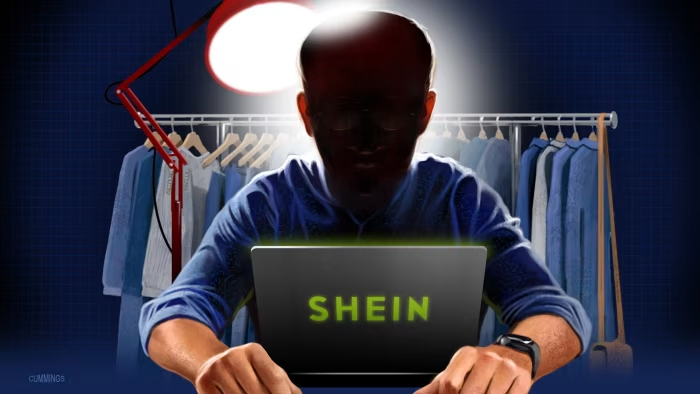It was supposed to be a triumph: Shein’s emergence from the shadows of online retail into a permanent physical boutique in one of the world’s most recognisable department stores in Paris, the global capital of fashion.
Instead, the China-founded fast fashion giant is this week dealing with French street protests, a government-led effort to ban it from operating in the country and allegations that third-party sellers on its site have been touting machetes, knuckle dusters and sex dolls that looked like children.
For Shein, the outcry in France is just the latest in a series of controversies that have plagued its years-long, multi-jurisdiction campaign to become a public company. For publicity shy founder Xu Yangtian, they will serve as a reminder that high-profile campaigns carry their own set of risks.
“He’s extremely low-key and inconspicuous,” says Hu Jianlong, founder of Shenzhen consultancy Brands Factory, adding that even Shein employees would struggle to correctly identify him.
“But if a company reaches such a large scale, with employees all over the world and then they are preparing for an IPO . . . At that point, it’s very difficult to maintain a low profile.”
Xu was born in Zibo, a manufacturing city in eastern China’s Shandong province, according to people who know him.
But while his name occasionally appears in company press releases, Shein’s website carries no picture or biographical information about its founder. He has never given a media interview, is rarely photographed publicly and hasn’t posted on social media for nearly a decade. There has even been confusion about his English name, which he changed from Chris to Sky.
A few details have been reported about his early life. Born in 1983, he got his first taste of international trade while at Qingdao university in the 2000s, sourcing orders of everything from gaskets to spark plugs. After graduation he moved to Nanjing where he founded an ecommerce business, touting a range of consumer goods directly to customers. Later, he co-founded wedding dress seller Sheinside, a precursor to the fast fashion company of today.
Shein’s low prices and vast choice led to meteoric success in western markets, particularly the US. Algorithms scour the web for trending ideas and feed them to designers, who then place orders with a network of about 7,000 contract suppliers, many clustered in Panyu, a manufacturing suburb of Guangzhou.
The company tests the popularity of new designs via ultra-small orders, only ordering more when it is sure there will be demand. This model allows Shein to offer millions of designs at any one time, according to a person familiar with the company, compared to tens of thousands at other mass market retailers.
“Xu effectively turned supply chain agility into a strategic weapon, disrupting legacy brands like H&M, Zara and Forever 21,” says Brittain Ladd, a US supply chain consultant who previously worked at Amazon and Dell.
But western retailers argue the company unfairly exploits customs tax exemptions granted to small value packages, known as de minimis in the US, allowing it to undercut domestic rivals.
US President Donald Trump’s ending of these exemptions — and similar efforts in the EU and the UK — has driven down Shein’s valuation just as it seeks to list its shares.
The location if its listing has also been in flux. While the company initially hoped to list in New York, allegations from lawmakers that it employs forced labour in its supply chain led it to focus on a London IPO.
A disagreement between Chinese and UK regulators over the language in its risk disclosure prompted a second pivot, this time to Hong Kong, where it has filed for a listing confidentially. Once valued at as much as $100bn, some investors are pushing the group to cut its valuation to around $30bn to speed up the process.
“Shein is at a critical point of figuring out its business model for the next five to 10 years,” says Sheng Lu, a professor at the University of Delaware who studies the fashion industry. “The challenge is the growth, how to keep expanding, how to further satisfy their investors, especially if they need to think about an IPO.”
In 2023, Shein launched a third party market place, in response to competition from nimble rival Temu. This allowed it to diversify into new categories, but sowed the seeds of its troubles in France.
French finance minister Roland Lescure has called the “horrors” for sale on Shein’s marketplace “disgusting”. Ministers said on Thursday that all Shein packages had been blocked for the past 24 hours as customs agents searched through them. The French government has also called for the EU to take action against Shein flouting European laws, including going so far as levying fines equivalent to 6 per cent of global revenues if it does not comply.
Xu now lives in Singapore, where the company moved its headquarters in 2022. Several people describe him as “shy” and introverted. One who has worked with him called him “rough around the edges”.
While some partners would like Xu to take a more public-facing role before the company lists its shares, the latest controversies explain his reticence. The backlash in France may only serve as a reminder of the comforts of near anonymity.
william.langley@ft.com, eleanor.olcott@ft.com, adrienne.klasa@ft.com
